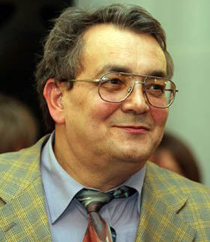
Yevhen Stankovych
Yevhen STANKOVYCH is one of the key figures in the contemporary musical culture of Eastern Europe. Since 1966, he has written 6 large symphonies, 10 chamber symphonies, a folk-opera (“When the Fern Blooms”), a chamber opera (“Opera Rustica”), 6 ballets, a large number of oratorical, chamber-vocal and instrumental pieces, as well as the music for 6 dramatic performances and over 100 movies. The composer was born on September 19, 1942 in the city of Svalyava in the Transcarpathian region of Ukraine. Like his Ukrainian born predecessor, Sergei Prokofiev, from his very first compositions, Stankovych established himself a composer of great dramatic talent. His refined technique, detailed polyphonic texture and universal lyricism evoke the style of the Baroque Period, while the full-blooded post-Romantic orchestration adds warmth and expression to his music. Stankovych’s creative works are extraordinary in their portrayal of emotional freedom, mastery of the subject matter, and in the versatility of form. Yevhen Stankovych has been awarded many honorary titles and awards, including “Hero of Ukraine”, the highest state award, as well as the highest awarded decoration for artistic activity – The Taras Shevchenko Ukrainian National Prize. In 1985, the organization UNESCO ranked his Third Chamber Symphony among the top ten compositions in the world. Stankovych’s compositions have been repeatedly performed in concert halls in Canada, the United States, Germany, France, England, the countries of former Yugoslavia, China, the Philippines, and in Eastern European countries. His compositions have been recorded in many countries by labels such as Melodiya, Analekta, AAV and Naxos. Prior to 1991 Yevhen Stankobych’s works were regularly censored or banned by Soviet authorities. The folk opera “When the Fern Blooms” was banned for its use of traditional Ukrainian folk melodies and their interpretation in a contemporary genre. The score, sets and costumes were destroyed by Soviet authorities. Excerpts from the work were first performed by the Winnipeg Symphony Orchestra in 1988. The ballet “Ol’ha” was repeatedly censored and was not performed in its original until after 1991. The ballet “The Agony: Rasputin” (originally titled “Prometheus”) was also severely censored; the work was first performed with its original music and libretto in 1989 in Skopje, Macedonia. The “Rasputin Suite” is now among his most performed orchestral works.
Titles:
- – Ukrainian Poem for Solo Violin and Chamber Orchestra
- – Sonata for Violin and Piano
- 1971/2023 – Sinfonietta No. 1: In Modo Collage
- 1979 – Elegy in Memory of Stanislav Liudkevych
- 1985 – Rasputin: Suite from the Ballet
- 2003 – Symphony No. 6
- 2004 – Liturgy of St. John Chrisostom (Chrysostom)
- 2006 – Violin Concerto No. 2
- 2006 – Violin Concerto No. 2 (reduction)
- 2010 – Dictum 2: Chamber Symphony No. 10
- 2013 – Angel’s Touch
- 2014 – Mirages
- 2015 – Chamber Symphony No. 12
- 2015 – Violin Concerto No. 3
- 2016 – Violin Concerto No. 4
- 2017 – Violin Concerto No. 5
- 2021 – Music for Heaven Musicians
- 2021 – Concerto for Four Horns and Strings (soli and piano reduction)
- 2021 – Legend from the Mountains for Viola and Strings
- 2021 – Legend from the Mountains for Viola, Strings and Piano
- 2021 – Legend from the Mountains (Viola, Piano Reduction)
- 2021 – Concerto for Four Horns and Strings
